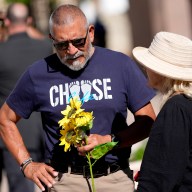OTTAWA – Stephen Harper will take a page out of Katy Perry’s pop songbook this parliamentary session.
The prime minister will let his Conservative colours burst for really the first time since he came to power in 2006, letting off a few political fireworks by slashing government spending, tinkering with pensions, aggressively promoting Canada’s resource sector and promoting a more classic-type of division of powers with the provinces.
The House of Commons resumes Monday after a six-week hiatus.
Harper had been criticized by even some right-wing pundits in the past for not being conservative enough — he raised spending year after year and hesitated to make any major, long-term changes to government policy.
But with a number of old promises fulfilled or about to be — eliminating the Canadian Wheat Board monopoly, the gun registry and political subsidies, for example — the majority Conservatives are finally free to think big and think blue.
“The priorities remain the same — job creation and economic growth. What we’re able to do right now perhaps is focus on more medium and long-term structural changes,” Government House Leader Peter Van Loan said in an interview.
“Canada has strong advantages, a very strong fiscal position, the lowest debt of any of the major G8 countries, how do we ensure that we stay in that position?”
During a speech to an economic forum in Switzerland last week, Harper signalled a number of “major transformations” he intends to introduce — including potential changes to Old Age Security (OAS), a new structure for research and development spending, and altering how immigrants are selected.
The Tories haven’t confirmed speculation they will raise the eligibility age for OAS to 67 from 65, but they are certainly dropping strong hints.
“We’ve already taken steps to ensure that our Canada Pension Plan is sustainable in the long term…another piece is to ensure that OAS remains sustainable in the medium and the long-term, so that people like myself are able to collect it 20, 30 years from now,” Van Loan said.
Natural Resources Minister Joe Oliver also said Sunday the government is considering new legislation that would limit the length for environmental hearings into new resources projects.
Meanwhile, Treasury Board President Tony Clement is targeting a $4-$8 billion cut to government spending, and examining cuts to public service and MPs’ pensions.
The initiatives are being sold under the banner of “job creation,” but the opposition isn’t seeing it that way.
NDP leadership candidates took direct shots at Harper during a debate Sunday — candidate Brian Topp called Harper a hypocrite for saying he supported families while “kicking them in the shins” with proposed OAS changes.
Count on the NDP to focus on the OAS issue as the House of Commons returns. Interim leader Nycole Turmel and finance critic Peter Julien will be meeting with the Canadian Association of Retired Persons on Monday.
“Mr. Harper campaigned on a platform of moderation, that he would be responsible and the reality is, the announcements we’ve seen over the past few weeks have been very immoderate and very irresponsible,” said Julien.
“We have a context where the government is profoundly out of touch and seems to be saying to Canadian families and seniors that you’re going to pay the price for the pet projects that we want to go forward with,” added Julien, referring to costs attached to an omnibus crime bill, a fighter-jet contract and corporate tax cuts.
Interim Liberal Leader Bob Rae also attempted to set the stage for the opening of Parliament with a policy speech, telling a Vancouver audience Saturday that Harper was about to dump more costs on the provinces by potentially raising the OAS age.
“This is what’s so wrong with how the country is being run at the moment,” Rae said. “It’s not the right way to do things. The country is a partnership. The federal government has always been present.”
But the Liberals will also be coming at the Conservatives from a different angle than the NDP. Liberal industry critic Marc Garneau says his party will be watching to see if the Tories can really make the required cuts to spending.
“This’ll be their first real test to see whether they can do the things that have to be done, they’ve certainly criticized our budget-cutting back in the ’90s, but we made difficult choices and we achieved our aims, and had some very successful zero-deficit surplus budgets for a long time,” said Garneau.
The atmosphere in the House of Commons was tense before Christmas — the opposition complained the government was making the parliamentary process more opaque and less collaborative.
The Liberals and NDP railed against time limits on legislative debates, on a move to put more committee business behind closed doors, on the rejection of their amendments to bills.
Several bills will be back on the table for debate this winter and spring — legislation to modernize the Copyright Act, a bill to create pooled pension plans in small businesses, a human smuggling bill, and the omnibus crime bill now before the Senate.
Van Loan suggests Parliament is working fine — it’s not paralysed like other legislatures around the world.
“We are quite happy to allow reasonable debate, that’s an important part of the process, but it’s also important that we make decisions, vote on bills, do the work that Canadians sent us to Parliament to do,” he said.
“When you talk to those folks in other parts of the world that are (facing) real economic challenges today … what they’ll tell you is that you’re lucky in Canada because at least you can make decisions.”













